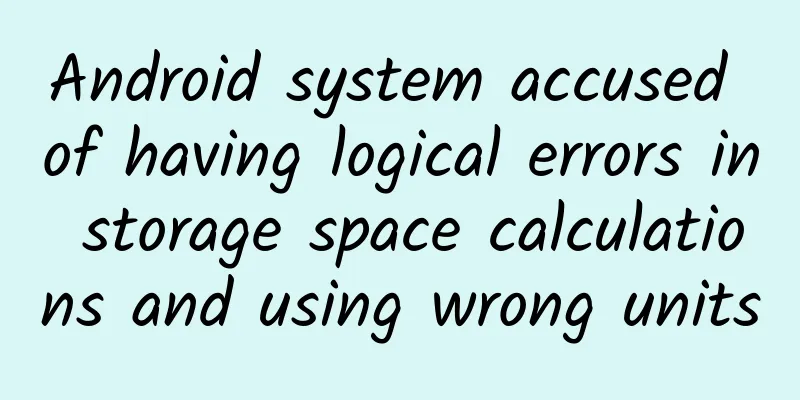Android system accused of having logical errors in storage space calculations and using wrong units

|
In recent years, the storage space of Android phones has increased significantly, and many manufacturers have stopped producing low-capacity models with 64GB, partly because the storage space required by the Android system and applications has also increased. However, the Android system has serious errors in calculating the storage space occupied by system components and uses non-standard units. We usually use the storage usage feature of the Android system to find out the apps and files that take up a lot of space so that we can uninstall or delete them when necessary. However, Android expert Mishaal Rahman found that Google's calculation of the space occupied by Android system components is flawed. Rahman executed a shell command to create a 3GB file in the /data/media/0 storage directory, which is not used to store Android system files. However, the storage space analysis of the phone showed an increase of 3GB of space under the system category, indicating that the system has suddenly become larger. This is because Android counts everything except other categories (including audio, video, pictures, documents, recycle bin, and games) as system space. Android 14 This flawed logic was also used to calculate storage usage. In addition, the File Manager app also showed a similar increase in system component storage usage, likely because it used the same untrustworthy calculation method. Other Android-based UIs also had the same incorrect storage space calculation issue, but Samsung has reportedly fixed the issue in the One UI 6 update . After running the same ADB command as in the previous experiment, Rahman confirmed that the increased space usage was displayed under the Other Files category, not the System category. IT Home noted that Rahman also pointed out another small but important problem, that is, Android uses different units when calculating storage usage and smartphone manufacturers advertise storage capacity. Most people think that mobile phone storage capacity is measured in bytes, which can be expressed as an exponential power of 10. There are 1000³ bytes in a gigabyte (GB), and smartphone manufacturers also advertise storage capacity in gigabytes. Android measures storage space in gigabytes (GiB), which is 1024³ bytes, because it is expressed as an exponential power of 2. Therefore, 1GB is equal to 0.93GiB . Due to this unit difference, smartphone users may think that the Android system installed on their phones takes up more GB than it actually does. Coupled with incorrect storage usage calculations, ordinary Android users may think that the project takes up more storage space than it actually does. Google needs to correct Android's calculation logic for the storage space occupied by system components and quantify all content using the GB unit that consumers are familiar with, which is also the unit used by all smartphone hardware manufacturers. |
>>: iOS 16.6.1 official version is released, it is recommended to upgrade!
Recommend
How to reduce user churn through effective operational activities?
The “Double 12” promotion kicked off the year-end...
iQOO Neo3 mobile phone review: Between 5G, performance and wallet, this is one of the most balanced models currently
As a new brand in 2019, iQOO has launched 5 or 6 ...
Let’s talk about how to operate personal content on the live streaming APP Xiaokaxiu?
How can one operate a product like Xiaokaxiu on h...
World Rabies Day丨Many people used to die at the hands of mad dogs, until he appeared...
Today is September 28, the 16th World Rabies Day....
HTC and Samsung in the past, Apple today: The unspoken rules that mobile phone manufacturers will understand only after the cold winter
On June 7, 1742, German mathematician Goldbach pr...
Gaomi SEO training: Some points to note when optimizing your website
As a user, we have to aim at the optimization pro...
Tencent's three do's and three don'ts in entering OTT smart TV
In recent days, rumors about Tencent's offici...
Who are the top advertisers in January? Industry Overview
According to the mobile advertising intelligence ...
Targeting Model Y? Volkswagen ID.4 CROZZ is on the market: 550km range, priced from RMB 199,900
New energy vehicles developed rapidly in 2020. Am...
Is your body exhausted? A table to calculate your fatigue index
Do you have the following symptoms? Your head fee...
XCMG and Oracle NetSuite establish a relationship to consolidate digitalization and welcome the new era of internationalization 2.0 development
As the world's third largest construction mac...
US mobile game market survey: middle-aged men are most willing to spend money
On October 17, Everyplay, a mobile game company u...
The fragrance of jasmine and the stench of poop are actually the same smell component, can you believe it!
The sense of smell is one of the most important s...
Apple’s new feature is gone in the iOS 17 beta version!
Recently, the topic of "Apple will prevent u...









